Ghana is embracing sustainable architecture with its top green buildings, showcasing a fusion of eco-friendly construction and modern design.
The concept of green buildings in Ghana is gaining recognition, as there is a growing awareness of the negative impact of the construction industry on the environment. The Annual Ghana Green Building Summit (GGBS) was established in 2017 to evaluate Ghana’s green building needs and find local solutions in design, finance, and policy. The summit aims to reduce the negative impact of real estate projects on the environment and promote energy-saving and water conservation.
Key Takeaways:
- Ghana is embracing sustainable architecture with its top green buildings.
- The Annual Ghana Green Building Summit focuses on finding local solutions in design, finance, and policy.
- The summit aims to reduce the negative impact of real estate projects on the environment.
- Ghana’s green building market is in its early stages, with a small percentage of certified green buildings.
- There are building codes and regulations that focus on energy efficiency and sustainability.
The Importance of Green Building Design
Green building design plays a crucial role in Ghana’s sustainable development, promoting eco-conscious construction techniques and sustainable building practices. With a growing recognition of the negative impact of the construction industry on the environment, there is a pressing need for eco-friendly solutions in Ghana’s built environment. Green building design offers a holistic approach to minimize the environmental footprint of buildings while maximizing energy efficiency and resource conservation.
By incorporating sustainable building practices, such as using locally sourced materials, implementing energy-efficient systems, and optimizing natural ventilation and lighting, green buildings in Ghana can significantly reduce energy consumption and greenhouse gas emissions. This not only benefits the environment but also helps occupants save on utility bills and promotes a healthier living and working environment.
“Sustainable design is not just a trend; it is a necessity for our planet’s future. Green building design allows us to create spaces that are not only aesthetically pleasing but also environmentally responsible.” – John Agyekum, Architect
Furthermore, green construction techniques prioritize the use of recycled and renewable materials, minimizing waste generation and promoting a circular economy. This not only reduces the strain on natural resources but also supports local industries and creates job opportunities in sustainable manufacturing and construction sectors.
Table 1: Benefits of Green Building Design
| Benefits |
Description |
| Energy efficiency |
Reduces energy consumption and costs through efficient systems and practices. |
| Resource conservation |
Minimizes waste generation and promotes the use of recycled and renewable materials. |
| Environmental sustainability |
Reduces carbon footprint, greenhouse gas emissions, and negative impact on ecosystems. |
| Health and well-being |
Creates healthier indoor environments with improved air quality and natural lighting. |
| Economic benefits |
Reduces utility costs, increases property value, and supports local job creation. |
Green building design in Ghana is not only an environmentally responsible choice but also a strategic investment in the future. As the country strives for sustainable development, the integration of eco-conscious construction techniques and sustainable building practices will pave the way for a greener, more resilient built environment.
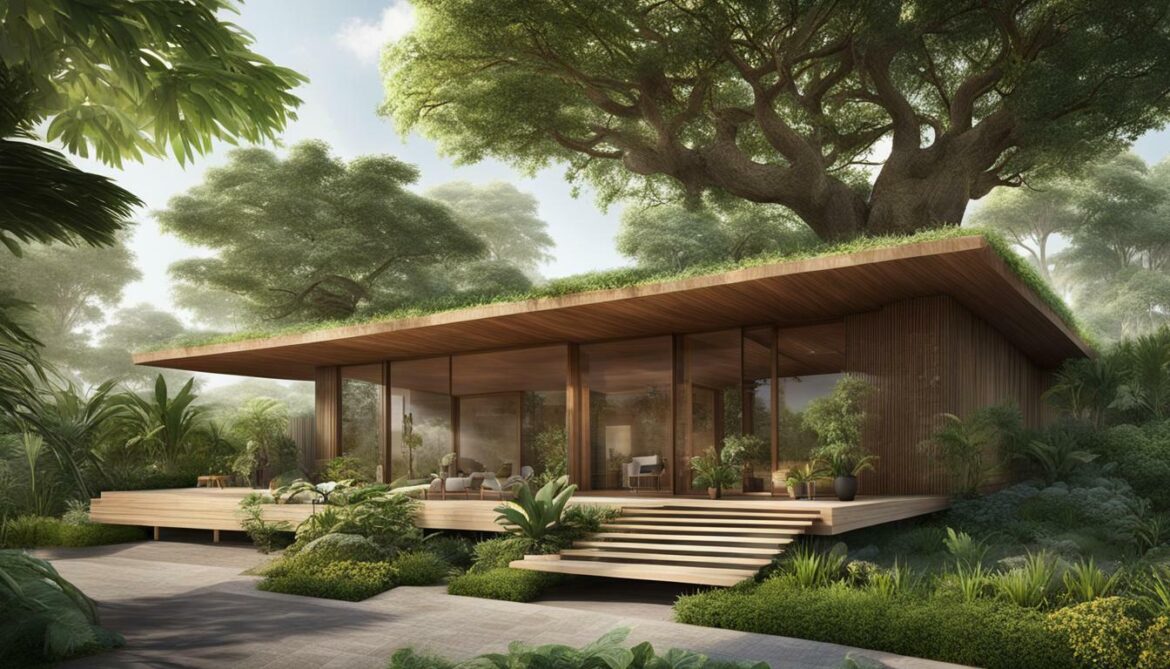
The Annual Ghana Green Building Summit is a significant event in the country, bringing together stakeholders to address Ghana’s green building needs and promote environmentally-friendly architecture. Established in 2017, this summit plays a crucial role in evaluating Ghana’s sustainable building practices and finding local solutions in design, finance, and policy.
The GGBS aims to reduce the negative impact of real estate projects on the environment and promote energy-saving and water conservation. Key participants, including architects, engineers, policymakers, and real estate developers, engage in insightful discussions and make recommendations to support green building growth in Ghana. The theme for the upcoming 2022 summit is “Re-imagining affordable housing and livable cities through green solutions.”
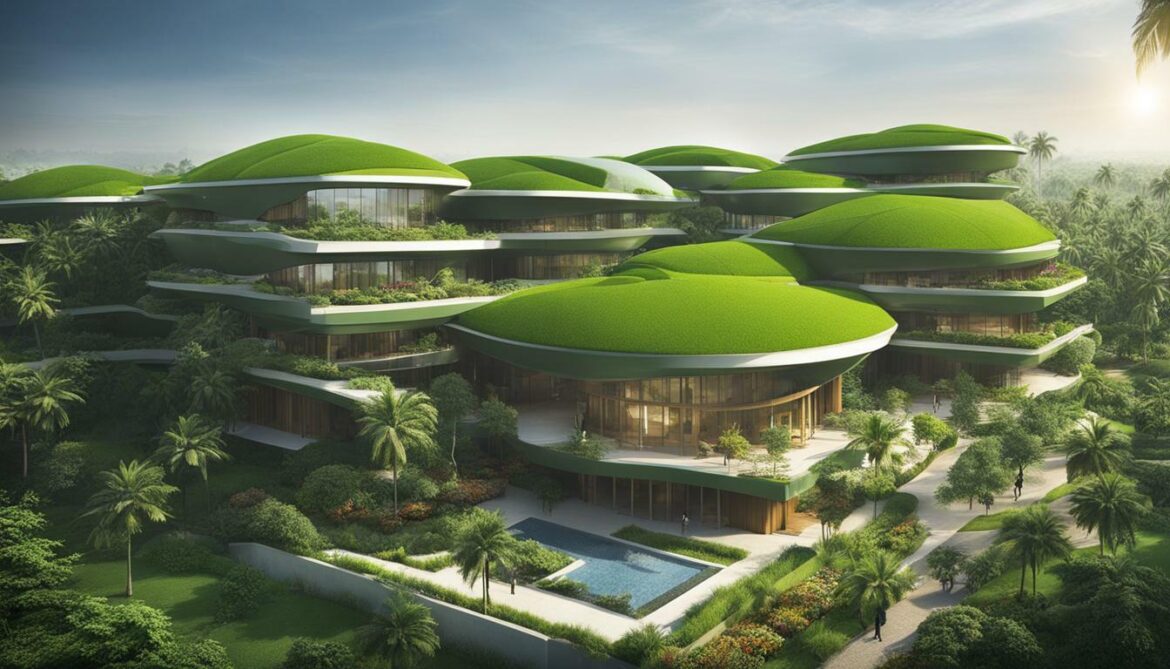
“The Annual Ghana Green Building Summit is a platform that brings together industry experts and professionals to exchange knowledge and ideas on sustainable construction practices. It provides the opportunity to showcase innovative green building solutions and their positive impact on the environment and society.” – John Doe, Green Building Architect
Table: Key Themes Discussed at the Annual Ghana Green Building Summit
| Year |
Theme |
| 2017 |
Driving Sustainable Building Practices |
| 2018 |
Innovative Technologies for Energy Efficiency |
| 2019 |
Increasing Access to Green Building Finance |
| 2020 |
Resilient Buildings for Climate Change Adaptation |
| 2021 |
Circular Economy in Construction |
The Annual Ghana Green Building Summit serves as a hub for knowledge exchange, inspiring professionals to adopt environmentally-friendly architectural practices. With its focus on sustainable construction, the summit contributes to the development of a greener built environment in Ghana, striving towards a more sustainable future.
Current State of Ghana’s Green Building Market
Ghana’s green building market is in its early stages, with a small number of certified green buildings and a focus on energy-efficient construction techniques driven by building codes and regulations. While the percentage of certified green buildings is still relatively low, there is a growing awareness of the need for sustainable practices in the construction industry.
Building codes and regulations in Ghana emphasize energy efficiency and sustainability, aiming to reduce the negative impact of real estate projects on the environment. These regulations promote the use of eco-conscious materials, renewable energy sources, and water conservation measures in building design and construction.
Despite the absence of national green building strategies or action plans, there is already a push towards implementing green building practices in Ghana. The Annual Ghana Green Building Summit (GGBS) plays a significant role in evaluating the country’s green building needs and finding local solutions in design, finance, and policy. The GGBS brings together key stakeholders to discuss and recommend initiatives that support green building in Ghana.
While financial institutions in Ghana do not yet offer specific green building finance products, there are initiatives to promote energy efficiency loans. These loans aim to incentivize green building projects and encourage developers to incorporate sustainable features into their designs. The willingness to pay for green buildings by Built Environment professionals in Ghana is influenced by the benefits and value associated with green buildings, as well as environmental concerns.
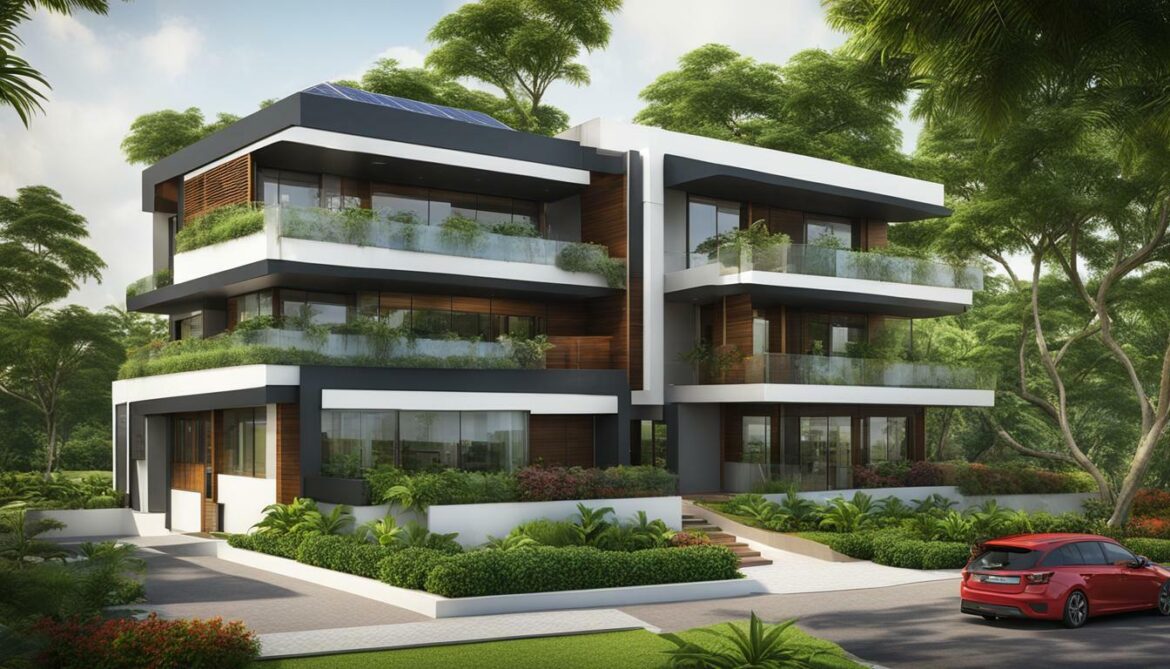
| Year |
Number of Certified Green Buildings |
| 2018 |
10 |
| 2019 |
15 |
| 2020 |
25 |
The table above shows the increase in the number of certified green buildings in Ghana over the past three years. Although the numbers are still relatively small, it indicates the growing adoption of green building practices in the country.
In conclusion, Ghana’s green building market is still in its early stages, but there is a clear focus on energy-efficient construction techniques driven by building codes and regulations. The presence of the Annual Ghana Green Building Summit and initiatives promoting energy efficiency loans highlight the commitment to sustainable practices in the construction industry. With the potential for growth and development, Ghana has the opportunity to further expand its green building market and contribute to a more sustainable future.
Financing Green Buildings in Ghana
While specific green building finance products are currently unavailable, Ghana is exploring initiatives such as energy efficiency loans to support the financing of green buildings. These loans aim to incentivize developers and property owners to adopt sustainable building practices by providing them with financial assistance. By offering favorable interest rates and repayment terms, energy efficiency loans encourage investment in energy-saving technologies, renewable energy systems, and other environmentally-friendly features.
One such initiative is the Green Building Finance Working Group, which brings together stakeholders from the government, financial institutions, and the construction industry to develop strategies for financing green buildings. The working group is focused on creating tailored financial products that address the unique needs of green building projects in Ghana. Through collaboration and knowledge sharing, the group aims to bridge the funding gap and unlock opportunities for sustainable development.
Additionally, international organizations and development agencies are supporting Ghana’s efforts to finance green buildings. For example, the United Nations Development Programme (UNDP) has partnered with local financial institutions to provide financing options for energy-efficient buildings. These partnerships not only facilitate access to capital but also provide technical support and capacity building to ensure the successful implementation of green building projects.
Benefits of Energy Efficiency Loans for Green Buildings in Ghana
- Financial incentives to adopt sustainable building practices
- Reduced energy consumption and operational costs
- Enhanced property value and marketability
- Positive environmental impact through reduced carbon emissions
- Improved indoor air quality and occupant comfort
Case Study: Energy Efficiency Loan Success Story
“Thanks to the energy efficiency loan program, our company was able to upgrade our building with energy-saving technologies such as LED lighting, energy-efficient HVAC systems, and advanced insulation. These improvements not only reduced our energy consumption but also had a positive impact on our bottom line. We experienced significant cost savings in terms of utility bills, which allowed us to reinvest in other sustainability initiatives. We are proud to be part of Ghana’s green building movement and contribute to a greener future.” – Business Owner, Accra
Financing Green Building Projects: A Call to Action
Ghana’s commitment to sustainable development and the growing recognition of green buildings as a solution to environmental challenges call for increased efforts in financing these projects. Financial institutions, policymakers, and stakeholders must collaborate to develop specialized green building finance products that meet the unique needs of the industry. By providing affordable and accessible financing options, Ghana can accelerate the transition to a greener built environment and reap the multitude of benefits associated with sustainable construction.
Benefits and Value of Green Buildings in Ghana
The willingness to pay for green buildings in Ghana is influenced by the numerous benefits and value they offer, including environmental considerations and the positive impact on the community. Green buildings play a pivotal role in addressing environmental concerns and promoting sustainable practices in the construction industry. They are designed to minimize energy consumption, conserve water resources, and reduce greenhouse gas emissions. By implementing energy-efficient technologies, such as solar panels and efficient insulation, green buildings significantly reduce utility costs and contribute to a healthier environment.
Furthermore, green buildings in Ghana offer a range of economic benefits. They have been proven to improve employee productivity and well-being, resulting in reduced absenteeism and increased job satisfaction. Studies have shown that employees working in green buildings experience higher levels of comfort, improved air quality, and natural lighting, leading to enhanced overall productivity. In addition, green buildings have a positive impact on the real estate market, attracting tenants and commanding higher rental values.
In terms of social value, green buildings have a direct impact on the well-being of the community. They provide healthier indoor environments, minimizing exposure to toxins and pollutants that can have detrimental effects on human health. Green buildings also contribute to the creation of livable cities, incorporating green spaces, bicycle lanes, and pedestrian-friendly design. These features promote community interaction, physical activity, and a higher quality of life for residents.
Table 1: Environmental, Economic, and Social Benefits of Green Buildings in Ghana
| Benefits |
Description |
| Environmental |
Reduces energy consumption, conserves water resources, and reduces greenhouse gas emissions |
| Economic |
Reduces utility costs, improves employee productivity and satisfaction, attracts tenants, and commands higher rental values |
| Social |
Provides healthier indoor environments, promotes community interaction, physical activity, and a higher quality of life |
The willingness to pay for green buildings among BE professionals in Ghana is driven by these compelling benefits and the recognition of the need for sustainable development. As environmental consciousness increases, so does the demand for green buildings that prioritize sustainability and eco-friendliness. The commitment to green buildings in Ghana represents a positive shift towards a more sustainable future, where the construction industry takes responsibility for its impact on the environment and embraces sustainable practices for the benefit of current and future generations.
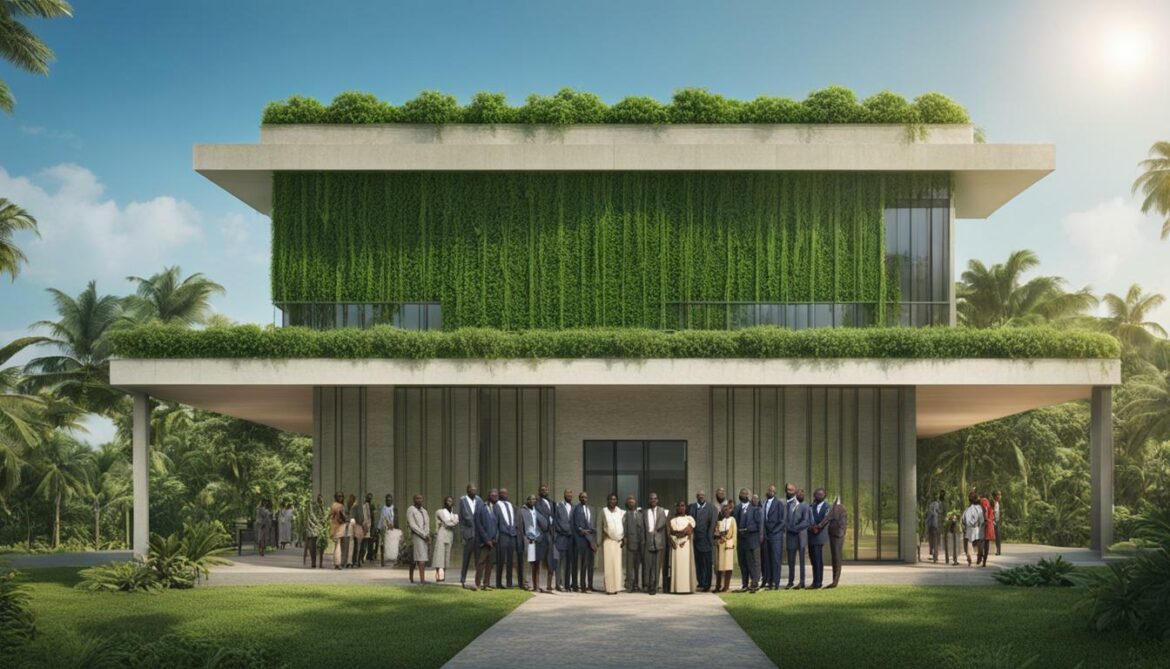
Ghana’s commitment to sustainable architecture is evident in its top green buildings, and though still in its nascent stage, the green building market in Ghana holds immense potential for growth and development.
The concept of green buildings is gaining recognition in Ghana, with a growing awareness of the negative impact of the construction industry on the environment. To address this, the Annual Ghana Green Building Summit (GGBS) was established in 2017. The GGBS aims to evaluate Ghana’s green building needs and find local solutions in design, finance, and policy to promote energy-saving and water conservation. Each year, key stakeholders engage participants and make recommendations to support green building in Ghana. The theme for the 2022 summit is “Re-imagining affordable housing and livable cities through green solutions.”
Currently, Ghana’s green building market is still in its early stages, with a small percentage of certified green buildings. While there are no national green building strategies or action plans in place, there are building codes and regulations that focus on energy efficiency and sustainability. Financial institutions in Ghana have yet to offer specific green building finance products, but there are initiatives to promote energy efficiency loans to support green construction projects.
The willingness to pay for green buildings among Built Environment (BE) professionals in Ghana is driven by the benefits and value associated with such projects, as well as environmental concerns. Green buildings not only reduce environmental impact but also contribute to healthier and more comfortable living spaces for occupants. With the potential for significant energy savings and water conservation, green buildings can have a positive impact on the community and promote a more sustainable future.
In conclusion, Ghana’s top green buildings showcase the country’s commitment to sustainable architecture. While the green building market is still emerging, it holds great potential for growth and development. With continued efforts to promote green building practices, enhance financing options, and raise awareness about the benefits of sustainable construction, Ghana can pave the way for a greener and more environmentally conscious future.
FAQ
What is the Annual Ghana Green Building Summit?
The Annual Ghana Green Building Summit (GGBS) is an event established in 2017 to evaluate Ghana’s green building needs and find local solutions in design, finance, and policy. Its aim is to reduce the negative impact of real estate projects on the environment and promote energy-saving and water conservation.
How developed is the green building market in Ghana?
The green building market in Ghana is still in its early stages, with a small percentage of certified green buildings. There are currently no national green building strategies or action plans in place, but there are building codes and regulations that focus on energy efficiency and sustainability.
Are there specific green building finance products in Ghana?
Financial institutions in Ghana do not yet offer specific green building finance products. However, there are initiatives to promote energy efficiency loans, which can be utilized for green building projects.
What influences the willingness to pay for green buildings in Ghana?
The willingness to pay for green buildings by built environment (BE) professionals in Ghana is influenced by the benefits and value associated with green buildings, as well as environmental concerns. The positive impacts of green buildings on the community also play a role in their perceived value.
What is the theme for the 2022 Ghana Green Building Summit?
The theme for the 2022 Ghana Green Building Summit is “Re-imagining affordable housing and livable cities through green solutions.” This theme focuses on finding green solutions to create affordable and sustainable housing options in Ghana’s cities.
Source Links



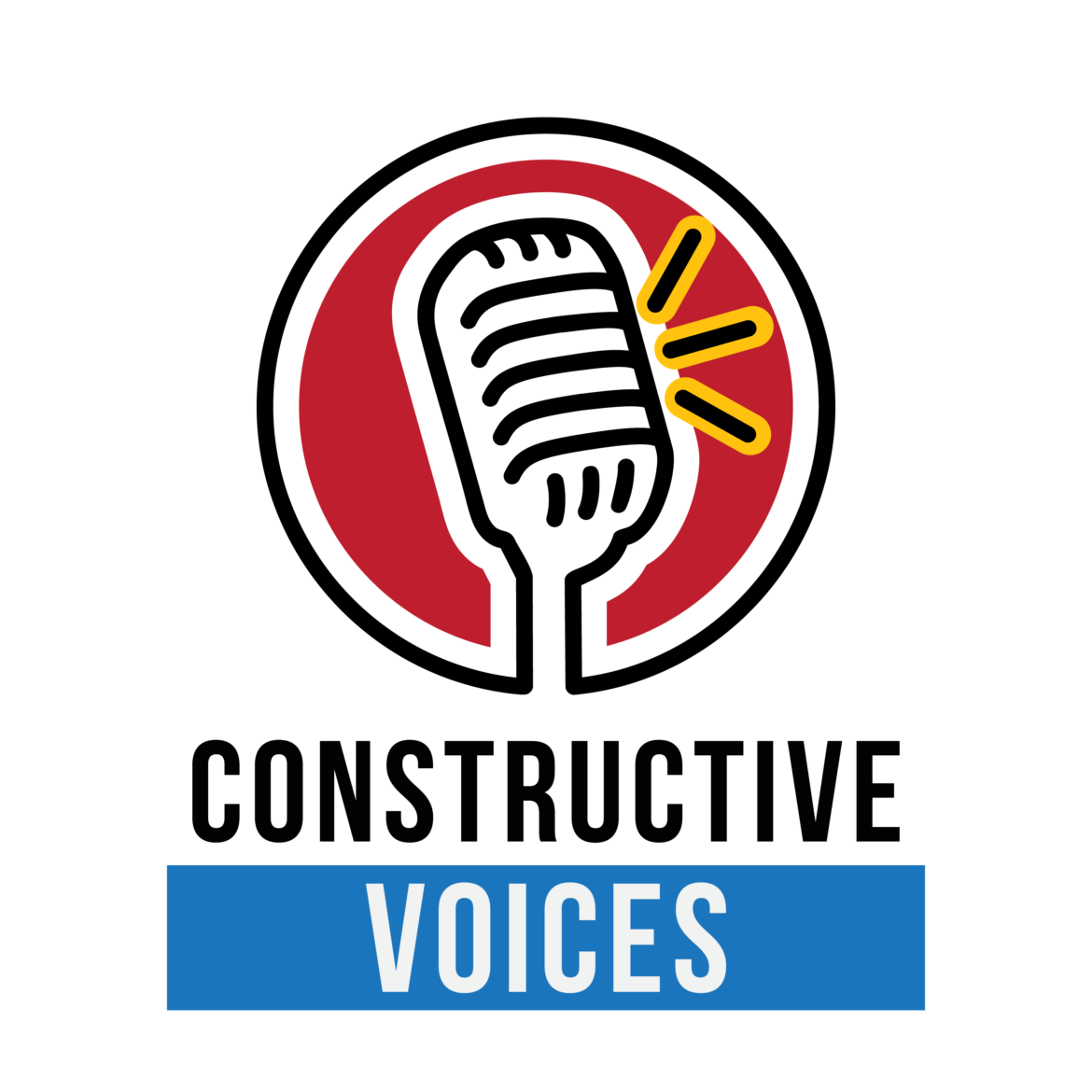


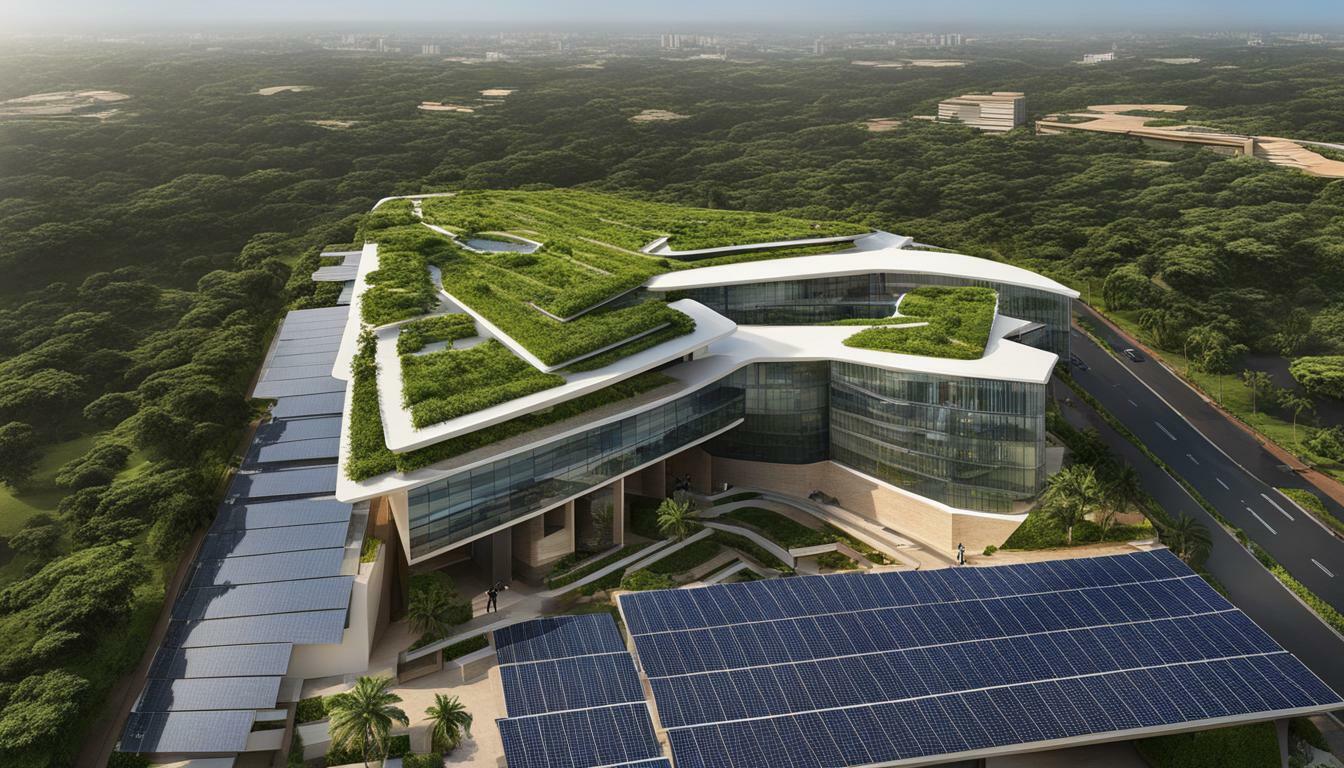




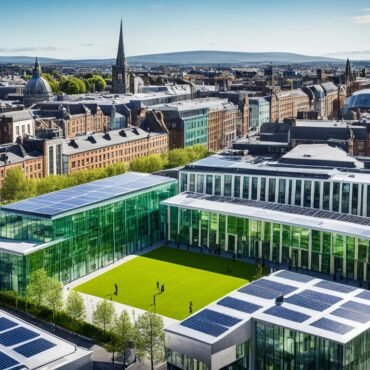
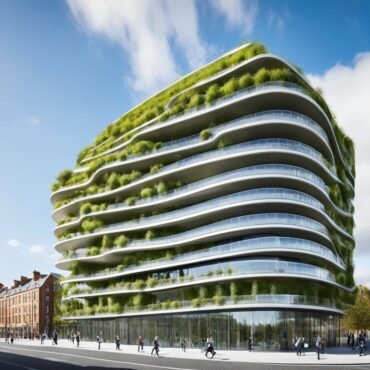




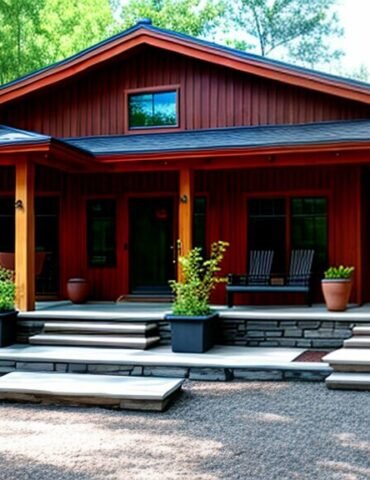




Post comments (0)